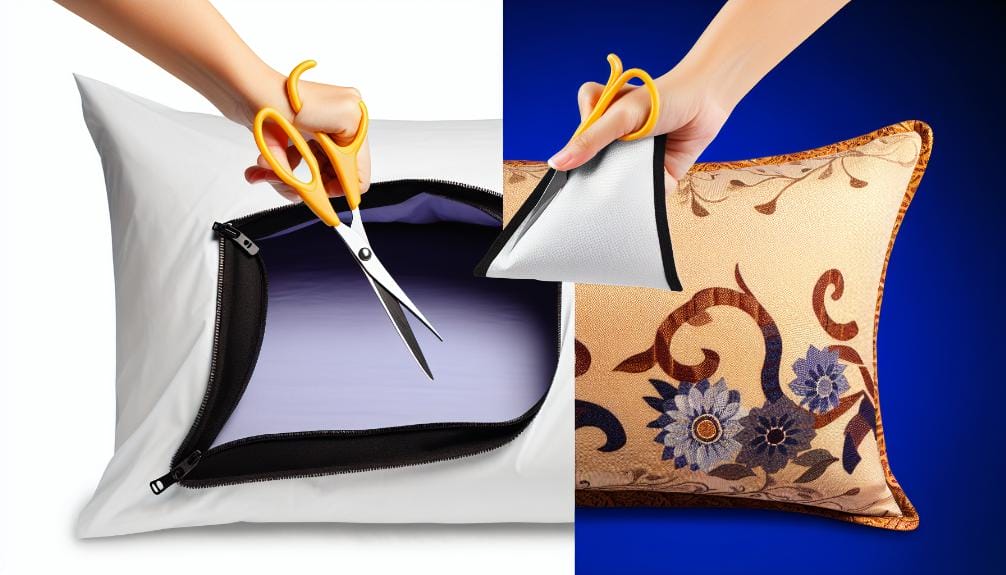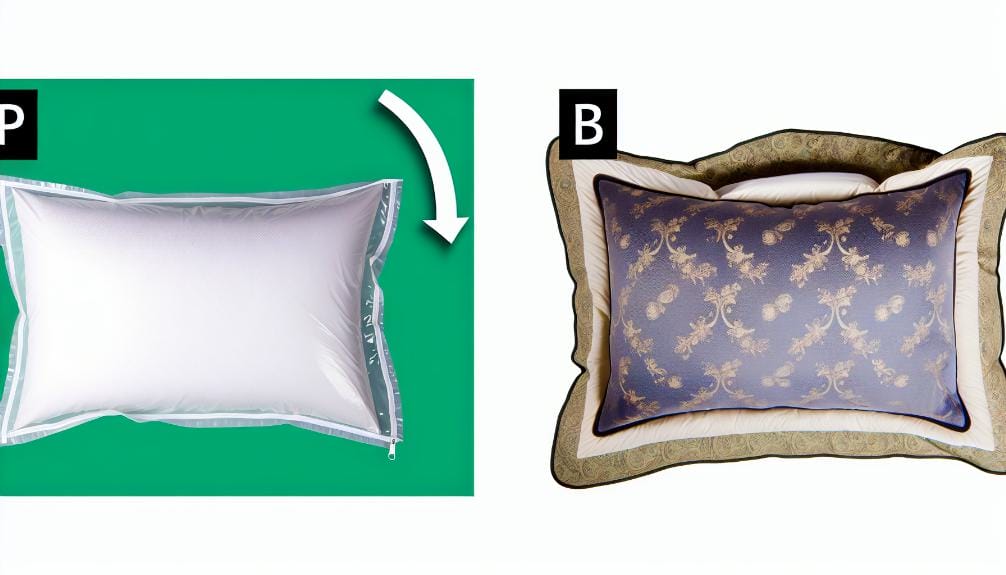Pillow Protector Vs Pillowcase – What’s the Difference?
In terms of safeguarding your pillows and ensuring a restful night’s sleep, the difference between a pillow protector and a pillowcase might surprise you. While both serve crucial functions, grasping their distinct roles can greatly benefit your bedding routine. So, before you decide on which to choose, let’s shed some light on the crucial differences between these two pillow essentials.
What is a Pillow Protector

A pillow protector is a crucial cover for your pillow that guards against stains, oils, and moisture. It adds an extra layer of defense, helping to keep your pillow clean and lasting longer.
Choose a protector that fits well and allows for breathability to keep your pillow fresh and in good condition.
Purpose of a Pillow Protector
Protect your pillow effectively with a high-quality pillow protector designed to guard against stains, moisture, and wear. These protectors serve as a barrier between your pillow and potential damage, helping to extend its lifespan.
Unlike regular pillowcases, protectors cover the entire pillow snugly, offering superior protection. They’re crucial for keeping your pillow clean and comfortable, especially given their direct contact with your skin during sleep.
Typically plain white and machine washable, pillow protectors work best when paired with pillowcases. They prevent yellowing, stains, and moisture buildup, acting as a shield against common issues that can degrade your pillow.
The right pillow protector helps your pillow breathe, maintain its shape, and stay free from compression, oils, and moisture, ultimately prolonging its life and keeping you comfortable.
Benefits of Using a Pillow Protector
Using a pillow protector is a smart way to keep your pillow in great shape and extend its lifespan. Here’s why it’s worth considering:
First off, a pillow protector shields your pillow from skin oils, sweat, and other moisture that can lead to yellowing and unpleasant odors. This added layer of protection keeps your pillow cleaner for longer.
When looking for a pillow protector, think about the fabric. Choose a material that feels good on your skin and won’t cause irritation. Fabric options are plentiful, so pick one that suits your skin sensitivity. Also, consider the color choices available to match your bedding seamlessly.
Thread count matters too. A higher thread count usually means a more durable and comfortable protector. It’s worth investing in one with a good thread count to ensure it holds up over time.
Lastly, pay attention to the cleaning instructions. Proper care will keep your pillow protector in top condition and, by extension, help your pillow last longer.
What is a Pillowcase
A pillowcase is a cover that protects your pillow from dirt, oils, and sweat. It helps keep your pillow clean and extends its life.
The material of your pillowcase can affect your sleep quality and skin health.
Purpose of a Pillowcase
A pillowcase is a crucial part of your bedding setup, providing both style and function. It serves as a soft barrier for your pillow, helping to keep it clean and prolong its life.
The type of fabric matters for your skin’s comfort—whether it’s silk, cotton, or microfiber, each material offers a different feel. Choosing the right pillowcase enhances the look of your bed and protects your pillow from oils, sweat, and other elements that could degrade it over time.
Investing in a high-quality pillowcase means your pillow stays in better condition, giving you a more comfortable sleep experience. Make sure you buy from reputable sources to avoid any hassle and enjoy a peaceful night’s sleep.
Pick a pillowcase that matches your style while also providing the comfort and protection you need for a good night’s rest.
Benefits of Using a Pillowcase
Using a pillowcase doesn’t just make your bed look nicer; it also helps protect your pillow. Pick a pillowcase fabric that fits your skin sensitivity. Fabrics like silk, cotton, and microfiber each offer different levels of comfort and breathability.
Your personal style also matters in choosing a pillowcase that matches your bedding. Beyond looks, pillowcases keep your pillow clean by blocking dirt, oils, and sweat, which helps it last longer. Follow washing instructions specific to the fabric type to keep your pillowcase fresh and durable.
Investing in quality pillowcases that suit your skin type and match your style not only improves the appearance of your bed but also protects your pillow, offering you a more comfortable and restful sleep.
Key Differences Between Pillow Protectors and Pillowcases

Let’s look at the main differences between pillow protectors and pillowcases.
The material they use affects their function, level of protection, and maintenance needs.
Knowing these distinctions will help you pick the best option to keep your pillows clean and comfortable.
Material
Pillow protectors and pillowcases serve different purposes and are made from distinct materials. Pillowcases are commonly found in silk, cotton, and microfiber, providing various fabric choices. This variety is crucial for individuals with sensitive skin, as certain materials are gentler than others—cotton, for example, is known for its softness and natural feel. Pillowcases also play a significant role in bedroom aesthetics, often chosen to match your bedding for a cohesive look.
On the flip side, pillow protectors are designed with durability in mind. They offer an extra layer of protection against stains, sweat, and oils, thus extending the life of your pillows. While comfort is a key factor in picking pillowcases, pillow protectors focus on functionality and longevity.
Consider factors like skin sensitivity, desire for bedding coordination, and the need for durability to determine what suits you better.
Function
To clearly distinguish between pillow protectors and pillowcases, consider their primary functions and how they meet different needs.
Pillowcases mainly serve as decorative covers for pillows, making your bed look more appealing. They’re available in various fabrics like silk, cotton, and microfiber, so you can choose based on personal preference and skin sensitivity. For example, cotton pillowcases offer natural thermoregulating properties, helping you maintain an ideal sleep temperature.
Pillow protectors, on the other hand, are designed to shield your pillow from stains, sweat, and oils. They fit snugly over the entire pillow, providing a barrier without adding bulk. Durability is key for pillow protectors; quality materials and construction can extend the life of your pillow.
Follow the specific care instructions to keep your pillow protector effective and prolong the lifespan of your pillow.
Protection
To grasp the difference between pillow shields and pillowcases, think about their main job: protecting your pillows. Pillow shields fully enclose the pillow, creating a snug barrier against stains, sweat, and oils. They fit tightly like a sleeve, shielding your pillow from elements that can shorten its lifespan.
The fabric of the pillow shield is crucial for skin contact and sleep quality. Choosing a shield that matches your skin sensitivity and comfort needs can enhance your overall sleep experience.
Using a pillow shield along with a pillowcase provides an extra layer of protection without adding bulk. This combination keeps your pillow cleaner and contributes to better sleep quality, extending the life of your favorite pillow.
Maintenance
Consider the key differences in maintenance between pillow protectors and pillowcases.
Pillow protectors are usually made from materials like polyester or vinyl, emphasizing protection over comfort. They serve as a barrier against stains, sweat, and oils. In contrast, pillowcases come in a variety of fabrics such as silk, cotton, and microfiber, catering to comfort and style, providing a soft, breathable surface for your skin.
Pillow protectors are designed for durability and easy cleaning, often requiring less frequent washing. This makes them ideal for those looking to extend the life of their pillows. Pillowcases, however, need more regular washing to stay fresh and hygienic. Some pillowcase fabrics even have certifications like Oeko-Tex or Egyptian cotton, signaling premium quality and authenticity for those who value luxury and comfort.
Ultimately, the choice between pillow protectors and pillowcases depends on your priorities.
If you need robust protection and low maintenance, go for pillow protectors.
If comfort and regular freshness are your goals, pillowcases are the way to go.
Which One Should You Choose
Choosing between a pillow protector and a pillowcase depends on your needs.
If you want to guard against stains, sweat, and oils, go for a pillow protector.
If you care more about style and comfort to match your bedding, pick a pillowcase.
Considerations for Choosing a Pillow Protector
Choosing the right pillow protector is essential for keeping your pillow clean and extending its life. Focus on the material and fit to make sure you get the best protection for your pillow. The fabric of the protector should be comfortable against your skin and provide a pleasant sleeping surface. Look for features like stain, sweat, and oil resistance to help your pillow last longer.
Well-constructed pillow protectors with double-row stitching, satin-corded edges, and high-quality zippers offer durability and a touch of elegance. Options like Snuggle Soft in white or Natural Nights organic protectors in ivory are available to suit different tastes.
A good pillow protector will shield your pillow from compression, oils, and moisture, keeping it clean and helping it maintain its shape over time.
Considerations for Choosing a Pillowcase
To choose the right pillowcase, focus on the material and design that suit your needs and preferences. The fabric is crucial as it directly affects skin contact. Different materials offer varying levels of comfort and breathability, so pick one that aligns with your sleeping habits.
Look for fabric certifications like the Cotton Egypt Association for Egyptian cotton to ensure authenticity and quality. Whether you enjoy the smooth texture of silk, the airy feel of cotton, or the sturdy nature of microfiber, prioritize comfort and skin health.
A pillowcase that matches your personal preferences and meets high-quality standards will greatly improve your sleep experience.
Frequently Asked Questions
Can You Use a Pillow Protector Without a Pillowcase?
You can use a pillow protector without a pillowcase for hygiene benefits, allergen protection, and waterproof options. Guarantee custom fitting for maximum effectiveness. Pillow protectors offer practicality while pillowcases add decorative options to your bedding ensemble.
Do Pillow Protectors Affect the Feel of the Pillow?
When using a pillow protector without a pillowcase, it can affect the feel based on your comfort preference. Material quality, hygiene concerns, durability, and aesthetic appeal are essential factors in deciding whether to use them together for best pillow protection.
Are Pillow Protectors Necessary for All Types of Pillows?
For all types of pillows, pillow protectors are essential. They safeguard your pillow material, offer allergen protection, and come in waterproof options with zipper closures. Choose a breathable fabric for ultimate comfort and longevity.
Can You Wash Pillow Protectors With Regular Laundry?
You can wash pillow protectors with regular laundry. They offer benefits like stain resistance and durability. Choose from fabric options like cotton, microfiber, or silk. Protectors guarantee your pillow’s longevity and cleanliness, making them a worthwhile investment.
Do Pillow Protectors Come in Different Sizes for Various Pillows?
When choosing pillow protectors, confirm compatibility with various pillow sizes. Enjoy benefits like protection from stains and moisture using materials like cotton or microfiber. Care for them by machine washing. Check for available sizes!
Conclusion
So, when deciding between a pillow protector and a pillowcase, bear in mind that protectors emphasize durability and protection, while pillowcases prioritize comfort and style.
Consider your needs and preferences to determine which option is most suitable for you. Whether you choose a protective barrier or a cozy cover, both serve crucial functions in preserving the cleanliness and longevity of your pillows.
Select the option that matches your priorities and savor a peaceful night’s rest!
